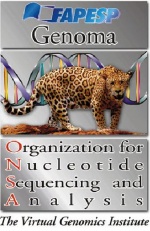From DNA Repair Lab
(Difference between revisions)
Revision as of 10:49, 25 May 2007
Root (Talk | contribs)
← Previous diff |
Revision as of 10:51, 25 May 2007
Root (Talk | contribs)
Next diff → |
| Line 1: |
Line 1: |
| - | | |
| | == '''Our participation in Genome projects.''' == | | == '''Our participation in Genome projects.''' == |
| | | | |
| | + | {| |
| | + | |- |
| | + | |[[Image:onsa.jpg|150px]] |
| | + | |Since 1998, this lab has been involved in genome sequencing projects coordinated by FAPESP. Basically, we were active members of the following projects: Xylella fastidiosa, Xanthomonas , Sugar Cane ESTs (SUCEST), Schistosoma mansoni and Aedes aegypti transcriptomes. The sequencing itself was only a way to develop research activities in several aspects, including bacterial genome evolution, and the identification of new genes involved in DNA repair and DNA damage tolerance. |
| | + | |- |
| | + | |colspan=2| |
| | | | |
| | | | |
| - | Since 1998, this lab has been involved in genome sequencing projects coordinated by FAPESP. Basically, we were active members of the following projects: Xylella fastidiosa, Xanthomonas , Sugar Cane ESTs (SUCEST), Schistosoma mansoni and Aedes aegypti transcriptomes. The sequencing itself was only a way to develop research activities in several aspects, including bacterial genome evolution, and the identification of new genes involved in DNA repair and DNA damage tolerance. | |
| | | | |
| | Main publications (complete list): | | Main publications (complete list): |
Revision as of 10:51, 25 May 2007
Our participation in Genome projects.

| Since 1998, this lab has been involved in genome sequencing projects coordinated by FAPESP. Basically, we were active members of the following projects: Xylella fastidiosa, Xanthomonas , Sugar Cane ESTs (SUCEST), Schistosoma mansoni and Aedes aegypti transcriptomes. The sequencing itself was only a way to develop research activities in several aspects, including bacterial genome evolution, and the identification of new genes involved in DNA repair and DNA damage tolerance.
|
|
Main publications (complete list):
7. Nene V et al, (2007) Genome Sequence of Aedes aegypti, a Major Arbovirus Vector. Science, in press.
6. Vincentz, M et al (2004) Evaluation of monocot and eudicot divergence using the sugarcane transcriptome. Plant Physiol. 134: 951-959.
5. Verjovski-Almeida S et al (2003) Transcriptome analysis of the acoelomate human parasite Schistosoma mansoni. Nature Genetics 35: 148-157
4. Vettore AL et al (2003) Analysis and Functional Annotation of an Expressed Sequence Tag Collection for Tropical Crop Sugarcane. Genome Res, 13(12): 2725-2735.
3. Van Sluys MA, Monteiro-Vitorello CB, Camargo LE, Menck CF, Da Silva AC, Ferro JA, Oliveira MC, Setubal JC, Kitajima JP, Simpson AJ (2002) Comparative genomic analysis of plant-associated bacteria. Annual Rev Phytopathol 40: 169-189.
2. da Silva AC et al (2002). Comparison of the genomes of two Xanthomonas pathogens with differing host specificities. Nature 417(6887): 459-463.
1. A. Simpson et al. (2000) “The genome sequence of the plant pathogen Xylella fastidiosa.” Nature 406: 151-157.
|
